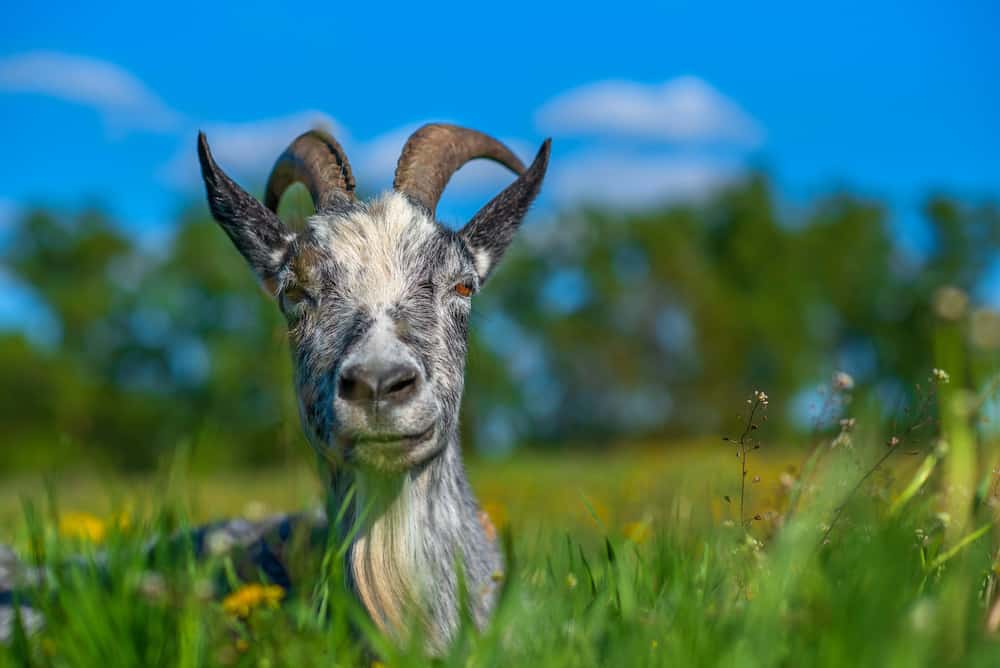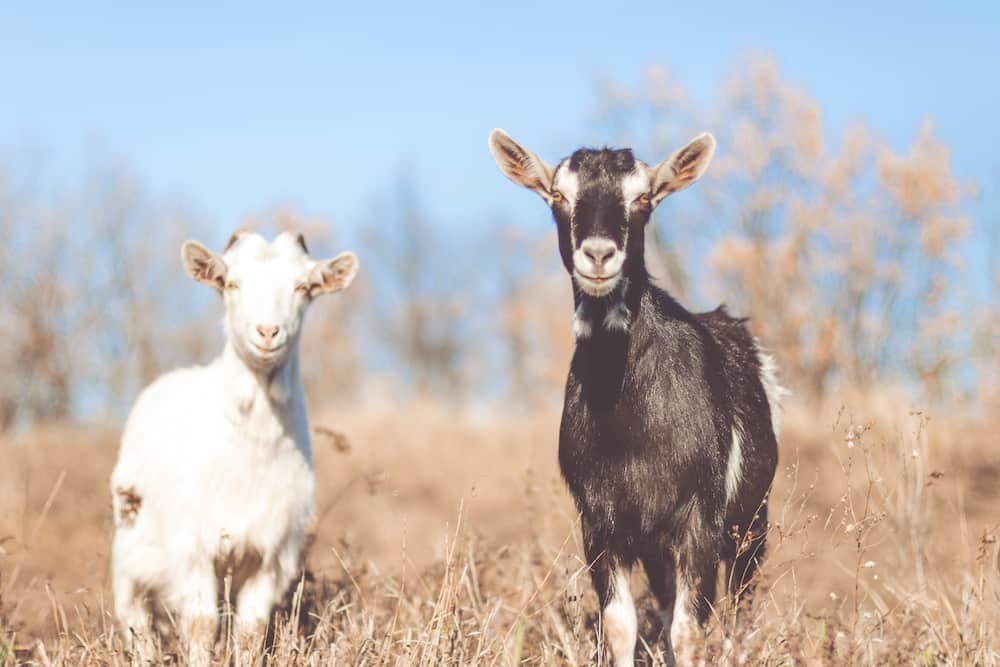When researching livestock and farm animals, you might come across wethered goats. They’re known for their specific advantages, which is why diversifying with wethered goats might be a great next step for your herd.
This article will explain what a wether goat is and explore the reasons why they might be a valuable addition to your farm. Read on to learn: How do they differ from bucks or normal male goats? What benefits do they bring to your land, home, and goat herd?
What Is a Wether Goat?
Simply put, a wether goat is a male goat that has been castrated. Wethered goats are male goats that can no longer reproduce.
Young male goats, also known as bucklings, will grow up to be bucks if left intact (with their testicles). Bucks can breed, but they also take on some problematic behaviors that might not be a good fit for your setup.
There are a few common ways of castrating goats. Most common is banding (placing a small band on the scrotum above the testicles that will stop the blood flow causing the testicles and scrotum to eventually shrivel and fall off). Others include cutting (opening the scrotum and pulling out the testicles) or emasculating (crushing the spermatic cords above the testicles). The castration procedure is relatively easy when it comes to goats. Castrated goats are usually back on their feet immediately.
Wethered goats will not be able to produce offspring, but they can still serve a great purpose on your homestead or farm.
What Are Wether Goats Used For?
There are numerous reasons you may decide to keep wethered goats on your farm. Wether goats are used for:
Community Outreach
Many people find that castrated goats are the best choice for community outreach. Petting farms, 4-H clubs, and other hands-on experiences can be good fit for castrated goats.
While does are able to perform these same tasks, you might be less willing to remove a doe from your herd or subject them to the possible diseases that outside people may bring.
Wethers can be playful, and they don’t get as aggressive as bucks do. So, they’re generally more safe to have around humans.
Monitor Breeding
Even though castrated goats cannot actually breed with the does that you have, they can help you know which does are in heat. If you have a few bucks for breeding, keeping neutered males with your does will help you breed more effectively.
These males will recognize when does are in heat, which can be useful in determining when breeding hasn’t taken. Breeding goats can be quite difficult in terms of knowing what was and was not successful, so these goats can be very useful.
Leading the Pack
Wethered male goats make great herd leaders. They can have strong protective instincts like billy (intact male) goats do. But, unlike most billy goats, you will not have to worry about them being unnecessarily aggressive towards the other members of the herd. They can also good at breaking up fights between does at times.
Remove Brush and Other Debris
Like all other goats, wethered goats are still great for clearing brush and other debris. You can let them roam in areas where you have overgrown shrubs and vegetation, and this will get things under control very quickly.
Generally, goats can chew through quite a bit of vegetation in a short time. That is why farmers use goats to help maintain land.
As Pack Animals
Some breeds of goats are better than others for pack carrying. Wethered goats are a good choice for pulling cards or carrying goods. They are large and strong but, as mentioned, don’t have as aggressive of a temperament as bucks, so they are easier to use for these purposes.
As a Loving Pet
Tame wethered goats can be affectionate, and even gentle with children. If you are ready to have a loving, happy pet, a wether goat can be a great choice. A Nigerian dwarf goat is a common option.
Unlike billy goats, they will not have a strong smell. Often, goats raised by bottle feeding can become very fond of human interaction and make the perfect addition to a petting zoo or just kept as a companion.
For Meat
Most farms raising goats for meat will often rely on wethered goats to bring to market. They can be kept with the herd and marketed once they are fully grown. Some dairy goat breeds, such as a Toggenburg goat, can be used for milk as well as meat.

Wethered Goats vs Bucks
Wether goats and bucks are both male goats, but what is the difference between them other than being castrated? Castration can lead to many differences in behavior and temperament.
The reasons someone would prefer a wether over a buck include:
No Hormonal Ruts and Smells
Intact male goats, known as bucks, get hormonal and go into a breeding rut during the breeding season. During the rut, they become very aggressive. They also stink due to the secretion produced by their scent glands.
Bucks also urinate and then get this scent on their faces as part of their breeding process. This smell is meant to attract does, but it can spread very far. Most people find this smell to be very unpleasant and prefer to avoid it.
Easy to Handle
Bucks have the reputation of being more challenging to handle than wethered goats. That is true even when they are not in heat, but the aggressiveness is often even more aggravated by their hormones.
Don’t Need Many Bucks
Your herd does not need many bucks. You should control the interactions between bucks and does. Meaning that you should keep bucks and does in separate pens. Most breeders believe that only the strongest bucks should be allowed to reproduce with the does. For that reason, keeping too many bucks can be difficult to manage or just unnecessary.
Simple Living Arrangements
Another benefit of keeping wether goats is that you do not need to separate them from your does. Bucks must be separated from does to prevent unintentional breeding and aggressiveness. In particular, bucks will be very aggressive towards kids (young goats), which can threaten your herd’s long-term health.
That means they need their own living arrangement, and that can be difficult to set up. Separate living arrangements can also be expensive to maintain, especially if you have limited space to work with. On the other hand, you can keep wethers alongside does without this worry.
Longer Lifespan
Wether goats tend to live longer than both does and bucks if they are not used for meat. This is because they do not need to go through the work that breeding requires. While does and bucks usually live between nine and 12 years, wethers may live for up to 16 years. However, ultimately, the overall health and care of the goat will determine how long it lives.
What Age Do You Wether a Goat?
If you have decided that castrating your goats is the right choice, you might be wondering and asking, “At what age do you wether a goat?“
In most cases, you should castrate male kids between the age of eight and twelve weeks. Ten weeks is always a good choice. There are potential problems with castrating too early or too late, so correct timing is important.
You can castrate goats as soon as both of their testicles are visible. This can take anywhere from 5-10 weeks. If you castrate them too soon, you will risk missing one of the testicles and having a goat that is still intact.
Doing the process too early may cause the wether’s urethra to develop incorrectly. They can develop a condition called urinary calculi, which can potentially be fatal. For that reason, it’s recommended not to castrate before they are 4 weeks of age.
If you wait too long to castrate male kids that stay with does, you could risk accidental breeding or goats with more “buck-like” behaviors. If a goat is allowed to reach maturity before it is castrated, it will likely still act like a buck in many ways.
There are cases of bucklings as young as two months old breeding does, so you want to be quick to either castrate or remove bucklings. Additionally, it is easier to castrate when the bucklings are smaller and less strong.
Any bucklings that are not castrated should be separated from doelings by the time that they are around two to three months old. This will prevent accidental breeding with siblings, and with doelings that have reached puberty but not maturity. Breeding a doeling that is too small can result in many different complications.
Wether Goats and their Benefits
When deciding how to populate your farm with goats, it’s important to consider does, bucks and wethers. You’ll also want to think about having enough space and the means to care for them. In general, wethers are easier to care for than bucks.
Most people who keep goats will castrate their male goats at a young age for them not to deal with unwieldy bucks or accidental breedings.
Depending on how many goats you plan to keep, there usually isn’t a reason to have more than one or two bucks.
What is a wether goat if not a great pet? Wethered goats can be friendly and fun to have around, and useful for a variety of tasks.
Plus, a wether goat will likely live longer than a buck.
This practice is prevalent in the goat industry. When you do it properly at the right time, it is more than acceptable to castrate male goats.
Related:

